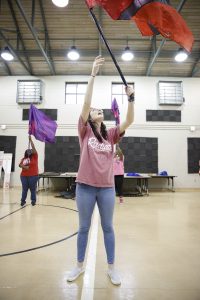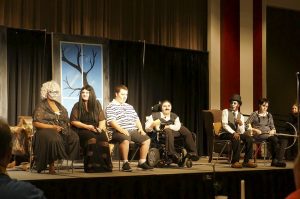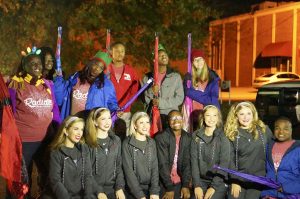UA Students Conceptualize, Execute Activities for Popular Transition Program
By David Miller

As University of Alabama graduate student Jessica Bowen turns, spins and tosses a flag into the air, it’s clear she’s done it before – and at a high level. But for the Million Dollar Band Color Guard alumna, her days of performing for 90,000 people at Bryant-Denny Stadium are now cherished memories.
On this day, in a small gymnasium in the Tom Barnes Education Building at UA, Bowen is teaching color guard routines to beginners. Positions and turns aren’t perfect, but that’s OK; the activity has underlying goals of teamwork, focus and fun. These common traits in team recreation and sport are crucial for Bowen’s nine color guard members, who are enrolled in UA’s CrossingPoints, a post-secondary transition program for individuals with intellectual disabilities.
“One of the foundations for an independent life is recreation and leisure, so we’re picking activities that we’re passionate about and interested in, and following through with it,” Bowen said. “And you have to work together and communicate, so there are implications across all fields, like interpersonal skills, but mainly recreation and leisure.”
Bowen, who will earn her master’s degree in special education in May, is a graduate assistant for CrossingPoints. She launched the color guard program in fall 2018 after CrossingPoints student Jasmine Beville expressed interest in helping the MDB. Bowen’s connections with the MDB yielded supplies and a dual-performance with UA’s color guard at the 2018 Tuscaloosa Christmas Parade.
The parade was a milestone for the color guard team, said Bowen, who was worried that a poor performance would cause her students to lose interest.
“It was a big moment – they felt like people were watching them, anticipating something they were getting to do,” Bowen said.
Color guard is on a growing list of activities providing opportunities for both CrossingPoints students and UA students involved in the program. Undergraduates and graduate students involved with CrossingPoints are continually encouraged to conceptualize and execute activities that align with the program’s pillars of improving academics, social skills and job hirability, and promoting independent living.
“We have our core things we do daily and yearly, but we’re always asking people to think outside the box and help us develop over time,” said Dr. Amy Williamson, CrossingPoints coordinator. “Our program wouldn’t be what it is without new people and ideas.”
Dinner and a show

CrossingPoints Dinner Theater is the program’s most visible and celebrated example of UA student-led activities. Each spring, CrossingPoints students pick a production, settle on scripts and costumes, and rehearse in the run-up to a public performance held at the Bryant Conference Center.
The creative venture covers academic and social skills requirements and “maximizes the efficacy” of the activity through continued rehearsal, where participants can reflect and learn about the characters and how they portray them, said Adam Tessler, a UA graduate who helped launch the theater.
“Providing a dramatic opportunity allowed students to practice hard skills, like reading, access to literature, and work with speech pathologists,” Tessler said, “but also some soft skills in practice and in understanding emotions of the character, building empathy, gaining confidence in practice, practicing self-esteem, and in understanding the way we can physically present ourselves and influence perceptions of who we are.”
Changing perceptions of individuals with disabilities was one of Tessler’s motives in leading the dinner theater, particularly in planning the logistics and goals for the second production, and being “blown away by how much room there was for students to succeed.”
“Everything I did that first year was instinctual and informed by an understanding of teaching,” Tessler said. “I realized, after that first year, that there was a massive arena that we could make bigger – the scale was just so small that first year, and buy-in was easy. So the second thing I learned was that, if we were going to do that and structure more opportunities for students to learn, then, strategically, we have to be deliberate and not settle for people thinking this was just something cute.”
CrossingPoints recently wrapped its 2019 dinner theater with a production of “Beauty and the Beast.” Past productions include “Alice in Wonderland” and “The Wizard of Oz.”
A “unique” experience

Mentors and teachers continue to advance existing programming and conceptualize future activities, from the annual Alpha Chi Omega and Kappa Delta-hosted spring formal, to the float they build and enter in the Tuscaloosa Christmas parade each year. And, CrossingPoints will soon begin a book club.
For UA students, the benefits are aplenty, especially for those aspiring to work in special education, Williamson said.
“This experience and environment is one that’s incredibly unique,” she said. “It’s a model that can be drawn from when students go out into teaching experiences, where they can be a lot more creative and see things in a different way … and not just do things because they’re cool, but because they lead to good outcomes.”
Bowen said the experimental aspect of creating the CrossingPoints color guard team helps in the program’s own research of special education and transitions, particularly in what’s most effective. Program mentors and teachers are given creative freedom, and there “haven’t been any closed doors” for materials or help.
“There aren’t a lot of programs out there like this, so when I do start looking for teaching jobs, I have this wealth of experience not a lot of applicants have,” Bowen said.
